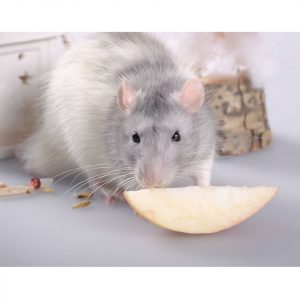Some individuals believe that giving lemon to your little furry friend is healthy, while some disagree. But can pet rats eat lemon?
In general, pet rats should not have lemon or any other citrus in any form. Pet rats will suffer consequences such as weight loss and lack of physical strength by ingesting certain citrus fruits.
Rumors regarding pet nutrition, especially rodents, are common, but you should know hearsay grounds to dig out the reality. One of the common myths is about feeding your rat with citrus fruits.
With that said, some benefits to giving some small quantities of lemon to pet rats, which we discuss later in this article.
Let’s discuss related questions to make them explicit by logical reasoning and scientific information.
Can rats have lemon juice?
If you are a rat owner wondering if rats like lemon juice, let me clarify: No, rats don’t like lemonade, and they don’t have it by themselves.
If you want to give lemonade to your pet rat, you can only do this by gavaging (which generally you shouldn’t do). Because of the citric acid, rats are reluctant to have it.
Citrus lemon juice does not bring many health benefits to rats, irrespective of gender. It just aids a bit in reducing hereditary kidney disease.
A study carried out on female Wistar rats by The University of Ibadan, Nigeria, showed that the gavaging of lemonade beyond a limit affected the reproductive cycle by disturbing metestrus and diestrus, the profile of lipid, and caused alterations in reproductive physiology.
Lemon isn’t a super popular food to eat among us humans due to its acidic taste. Plus, large quantities could also be harmful to us.
Due to their survival instincts, pet rats are even less likely to enjoy and want to ingest lemon, even in liquid form!
Can rats have lemon seeds?
Rats are reluctant to eat seeds because they contain different fatty acids like 21.03% palmitic acid, stearic acid, phenolics, etc. If your rat consumes these, it will experience some adverse effects.
Sunflowers are the best choice if you want to feed your rat with seeds. You can purchase them and provide your rats with a healthy diet weekly. But make sure that they are not salty.
Alternatively, you can give them pumpkin, sesame seeds, or even quinoa! These are perfectly safe for them, as long as they’re offered in small quantities and have no added salt.
Take the opportunity to start having some of these at home because they make a good snack for your pet rats and you!
Can rats have oranges?
Rats occasionally have oranges because they contain a natural substance called d-limonene, a terpene responsible for the aroma. It is used for fragrance or flavoring and in cosmetics etc.
Studies have shown that excessive d-limonene can be dangerous for male rats.
It reacts in male rodents only because of a specific protein that produces carcinogens and cancer in your rat’s kidney.
Rats exposed to a high concentration of d-limonene should not be fed with orange.
Due to the adverse effects that d-limonene can cause, pet rat owners should avoid feeding their rats orange and provide them with other beneficial fruits and vegetables.

Apples, pears, bananas, blueberries, and even melon are more suitable fruits for your pet rats, and most of them you can find and buy throughout the whole year!
We always have apples at home since they’re easy to prepare and often share them with our girls. It’s an excellent addition to their diet but also good for their teeth.
Can rats have an orange peel?
Just like the orange itself, the orange peel also contains d-limonene.
As we’ve just seen, this substance is carcinogenic, especially for male rats! In general, best keep oranges away from your pet rats.
Since they’re, generally, acidic fruit and its peel don’t have the most appealing taste either, your pet rats are most likely not even to find interest in them.
You can give your pet rat many possible fruits and veggies, most of which you might have at home already!
Which fruits and vegetables are beneficial for pet rats?
Rats avoid eating some foods because of their appearance and fragrances. On the other hand, they have some favorites as well.
Below are some fruits and vegetables you can give your pet rat without worrying about safety!
Fruits
Feeding your rat with fruits results in a balanced diet, but you should give it to them in low quantities.
Fruits have lots of sugar, meaning large quantities will make your rat obese and result in loose poop. It’s also good to avoid feeding your rat pre-packed foods.
Here is the list of fruits you can give your pet rat:
- Apple without seeds should be given not more than a single piece.
- Banana, only a tiny piece
- Provide limited avocados as they can make your rat obese because of fats.
- Purple grapes, mainly because they aid in preventing cancer in rats.
Vegetables
Vegetables have less sugar compared to fruits, and this makes them healthier.
Salad is recommended for an adult rat, and fresh veggies are always the way to go.
The following vegetables are excellent and safe for your pet rat:
- Potatoes either in slices or mashed
- Pumpkins should be provided without seeds as they are high in fats
- Rats can eat broccoli, but it can cause foul stools
- Corn is one of the best veggies but don’t feed your pet rat dry corn! Dry corn, more often than not, contains mold, which will be bad for your pet rat! Canned corn is a good option, for example.
Risk of Kidney Disease in Pet Rats
Much research has been carried out about the rat’s kidney ailments as their anatomy is similar to humans, which has resulted in digging out the reasons behind it in humans and rats.
Your pet rat is more prone to kidney diseases than lung ailments and tumors.
Rats have two kidneys, and each has thousands of small filtering mediums called glomerules.
Glomerules are approximately 35000 in number when your pet rat is born, and they continue to reduce over time. When this number decreases to 9000, the signs of kidney malfunction appear.
Your pet rat kidneys start changing structure at an early age. As time passes, it continues to happen.
When a rat is one year old, the signs of abnormality appear due to the loss of filtering structure in the kidney.
Male rodents are more prone to kidney problems than their female counterparts!
What do rats with kidney disease look like?
Kidney malfunctioning results in a lean and malaise appearance of your pet rat.
It is due to the circulation of toxic substances in the blood of your rat, and the kidneys can’t eliminate these toxins.
Most of the time, you will notice that your rat is less active than usual. A sick pet rat won’t be as interested in playing as before, and their routine and activity will change drastically.
Another thing you might notice is that your pet rat won’t welcome your touch. When pet rats are sick, they tend to hide it.
Fleeing from you, trying to avoid touch, or even seeming nervous when interacting with them is a prevalent behavior in a sick pet rat!
Their behavior is always crucial to understand if a pet rat is sick or not. If they’re not acting as their usual self, chances are, there’s something up with your pet rat.
How to diagnose if your rat has kidney disease?
If you notice your pet rat looks sick, the best action is to take them to the vet as soon as possible.
Pet rats are very fragile, meaning a minor issue can rapidly evolve into something much more severe. For that reason, it’s good to have them checked out fast, so it is easier to treat!
For diagnosing, vets usually take blood and urine samples. Rats with glomerulonephritis have a high protein concentration in their urine.
Your veterinarian will conduct blood and urine tests on the rat to confirm the diagnosis.
A rat with glomerulonephritis will typically have an excessive amount of protein in its urine. Also, its urine will also have an abnormal specific gravity.

Specific gravity measures the kidney’s ability to concentrate or dilute urine concerning plasma.
After diagnosis, your vet will tell you the best course of action, the gravity of the situation, and the treatment to follow.
What are the causes of kidney diseases in rats?
The following are some factors that can result in kidney malfunctioning:
- Feeding a diet with high calories and protein concentration
- Rat is overweight
- Age factor
- Infections due to bacteria
Due to their sensitive system, providing your pet rat with a balanced and healthy diet is very important.
It’s a common misconception that rodents can eat everything. If you give them, they will, but that doesn’t mean it’s good for them.
A good and nutritious dry ration, like the Oxbow Essentials, is a must, along with the occasional fresh fruit and vegetables for extra vitamins!
If you want to know what more you can feed your pet rat, along with quantities, we have a guide on How Much And How Often Should You Feed Your Pet Rat, so do check it out.
What are the signs of kidney disease in your rat?
The following signs are observed in your rat when it is suffering from kidney disease:
- Restlessness
- Proteinuria
- Isosthenuria (kidneys cannot control specific gravity of urine)
- Reduced weight
- Difficulty in urinating
- Urine with blood and bad smell
Many of these are very difficult to identify when watching your pet rat throughout the day.
However, as mentioned before, your pet rat will be less energetic, and their demeanor will change when sick.
Watching and knowing their behavior is one of the best ways to discern your pet rats’ health.
A sick pet rat will also avoid food and not take any interest in the foods/snacks you offer them.
A pet rat’s fur should look smooth, clean, shiny, and groomed while healthy! More often than not, pet rats’ fur will also appear fuzzy and disgruntled when they’re sick.
What measures should be taken to prevent kidney disease in rats?
Rats are genetically predisposed to kidney disease, so avoiding it altogether is almost impossible.
Taking preventive steps can help your rat have a better life quality and reduces the chances of your pet rat falling prey to kidney problems.
The following steps help in avoiding kidney disease in your small furry friend:
- Avoid feeding your rat with high protein foods
- Increase intake of foods having carbs and specified fats
- Maintain the intake of Phosphorus
- Maintain calorie intake according to the requirement of your rat
- Maintain the intake of Sodium
It’s also important to note that if for some reason, your pet rat needs additional supplements of vitamins, it should be discussed with your veterinary.
They can and will conduct tests to know what’s best for your rodent friend and then prescribe or indicate what else you can do to complement their diet for a healthy life!
Can lemonade be beneficial for the treatment of kidney disease in rats?
Many pet owners would agree that lemonade is beneficial for treating kidney diseases, but when asked about the authenticity and source of this fact, most fail to provide any.
Let’s end this discussion based on accurate scientific information:
Urolithiasis or kidney stones is widespread in male rats due to oxalates of calcium.
Due to more chances of male rats suffering from this problem, male Wistars (laboratory rats) were studied to observe the upshots of lemon juice in treating it.
Four groups were made to carry out the study; each group contained six rats.
The first group drank water that contained Ethylene Glycol, approximately .8 % by volume, and Ammonium Chloride, 2 % by weight to volume ratio.
The other three groups were gavaged (forced feeding tubes to administer the substance in the stomach) with 100, 75, and 50 volume by volume percent of lemonade.
This experiment lasted ten days; after that, all the rats’ serum samples were taken.
Along with this, all rat’s kidneys were examined. The left kidney was observed by flame spectroscopy to monitor the calcium deposit or concentration, while the right was dissected for histopathological assessment (microscopic examination of tissues and cells).
Those gavaged with lemon juice were called negative rats and others as positive.
Results showed that the Wistar rats that drank only Ethylene Glycol and Ammonium Chloride had higher calcium concentrations than lemonade-treated ones.
The histopathological analysis showed that lemon juice-treated rats had no deposits of calcium oxalate while the positive rats had it.
This study suggested that if your rat suffers from a kidney ailment, gavaging lemonade will be a proactive remedy against it.
Again, the best action is to ask your vet their opinion and what treatment to follow!
They are professionals and know better what to do; this way, you’re sure your pet rat is safe.
Final Words
Kidney disease in rodents is common and worsens as your pet ages.
It results in weakness, lethargy, lean appearance, loss of appetite, foul smell, bloody urine, etc.
The reasons behind this happening is the high level of protein and calcium intake as well as obesity.
To curb this, you should take precautionary measures.
Feeding lemon to your rats is almost impossible because of excessive citrus. But they can be gavaged for the sake of treatment.
However, always consult your veterinarian before feeding your pet something new.
And if you want to create a healthy diet for your pet rat, do check out this article.




